Blog

There are many deciduous trees that you can plant in your landscape that will produce brilliant fall colors. With fall being only one of the four seasons, many homeowners look for trees that have benefits during other parts of the year as well, such as cooling shade, privacy, or even year-round color and interest.
Here at Moon Valley Nurseries, we love practical and versatile trees. When we’re talking about trees that have attractive autumn colors and fall foliage, we are also looking for trees that are fast-growing and will accomplish several other landscape tree uses as well.
Here are 7 types of deciduous trees that provide incredible fall color in addition to shade, privacy, and curb appeal during the rest of the year.
-1.png?width=500&name=Untitled%20design%20(23)-1.png)
1. Chinese Pistache “Red Push” (Pistacia x 'Red Push')
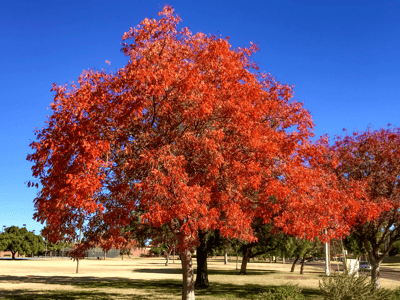 The Chinese Pistache tree, sometimes mistakenly referred to as Chinese Pistachio, is fast becoming a favorite for home and business owners across the western United States for its hardiness, low maintenance, and great shade and appearance.
The Chinese Pistache tree, sometimes mistakenly referred to as Chinese Pistachio, is fast becoming a favorite for home and business owners across the western United States for its hardiness, low maintenance, and great shade and appearance.
These trees are commonly used as shade trees for a wide variety of property types and home styles. They are equally happy in classic Mediterranean-themed landscapes as they are in tropical backyard designs and modern, artful landscape arrangements.
The Chinese Pistache is easy to care for and drought-tolerant once established. These easy-care trees are complemented by an attractive and stunning fall foliage color of deep burgundy red. Chinese pistache trees are truly a seasonal treat during autumn with their vibrant red canopies, but the color doesn’t stop in the winter. During the spring and summer growing seasons, “Red Push” Chinese Pistache develop a reddish-orange hue on their new growth, adding year-round interest to these beautiful trees.
Chinese Pistache Traits & Care Tips
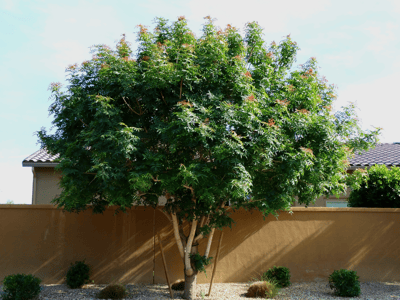 Fall Color: Deep red with fiery orange accents
Fall Color: Deep red with fiery orange accents
Landscape Uses: Shade, privacy, property borders, ornamental, seasonal fall color
Sun Exposure: Full sun
Water Needs: Moderate to low once established, drought-tolerant
Care Tips: Trim and prune to maintain desired canopy shape and size, fertilize monthly from spring to fall for more lush growth
-1.png?width=500&name=Untitled%20design%20(23)-1.png)
2. Raywood Ash (Fraxinus oxycarpa 'Raywood')
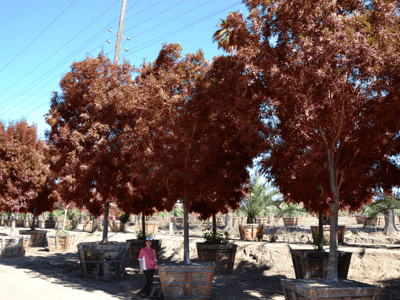 The Raywood Ash is a Mediterranean native that can grow to be a large tree with a round-headed form, capable of providing huge amounts of summer shade. In the fall, the attractive dark green knife-shaped leaves turn to an alluring red wine hue, providing year-round color!
The Raywood Ash is a Mediterranean native that can grow to be a large tree with a round-headed form, capable of providing huge amounts of summer shade. In the fall, the attractive dark green knife-shaped leaves turn to an alluring red wine hue, providing year-round color!
The Raywood Ash variety are fast-growing trees, and one of the best trees to add a pop of shade and color to any landscape as well as bring your home plenty of curb appeal! They thrive in locations that get plenty of full sun exposure and once established; they are drought resistant with little to moderate watering requirements.
Once the leaves drop, these trees let the warmth of the sun in, and you'll only need to do a one-time easy cleanup! The foliage comes back in the spring at a fast growth rate, just in time to cool off your home and keep you comfortable during the summer months.
Raywood Ash Traits & Care Tips
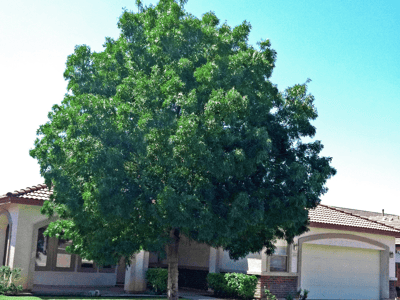 Fall Color: Deep wine red
Fall Color: Deep wine red
Landscape Uses: Shade, Seasonal fall color, privacy screening, property borders, erosion control
Sun Exposure: Full sun
Water Needs: Low to moderate, drought-tolerant once established
Care Tips: Monthly applications of fertilizer from early to spring to early fall will promote more foliage and fuller fall color. Trim and prune to shape the canopy as desired as Raywood Ash trees handle pruning exceptionally well.-1.png?width=500&name=Untitled%20design%20(23)-1.png)
3. Crape Myrtle (Lagerstroemia)
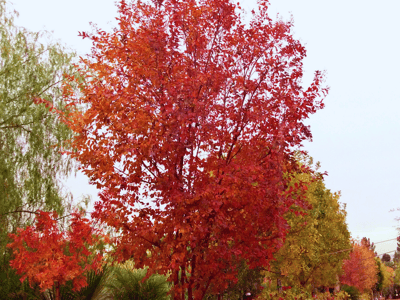 Crape Myrtle trees bring a lot to the table when it comes to augmenting your yard with year-round color. They are moderate to fast-growing trees that bloom enormous clusters of flowers in the spring. Crape Myrtle flowers can bloom in a variety of colors depending on the tree variety. These colors can include white, pink, red, lavender, and purple flowers and the Crape Myrtle will stay in bloom into the late summer.
Crape Myrtle trees bring a lot to the table when it comes to augmenting your yard with year-round color. They are moderate to fast-growing trees that bloom enormous clusters of flowers in the spring. Crape Myrtle flowers can bloom in a variety of colors depending on the tree variety. These colors can include white, pink, red, lavender, and purple flowers and the Crape Myrtle will stay in bloom into the late summer.
The fall color of Crape Myrtle trees is nothing short of astonishing. If the idea of a landscape tree that provides autumn colors of yellow, gold, and orange-red sounds interesting to you, then Crape Myrtles will not disappoint! Their myriad of colorful fall foliage will highlight your landscape with year-round interest and when used as a street tree, bring loads of curb appeal.
They make a lovely shade tree as well, able to provide a healthy canopy of shade to areas of your home or landscape. They are cold-hardy and love to be planted in full sun exposures. Crape Myrtles also become drought tolerant once established and are easy to care for throughout the year.
Crape Myrtle Traits & Care Tips
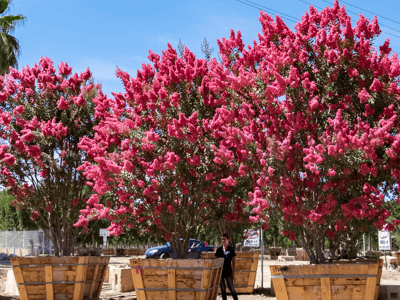 Fall Color: Orange-red and golden-yellow
Fall Color: Orange-red and golden-yellow
Landscape Uses: Ornamental flowering tree, seasonal fall color, shade, and privacy
Sun Exposure: Full sun to partial sun
Water Needs: Moderate to drought-tolerant once established.
Care Tips: Trim and prune to maintain desired canopy shape, fertilize monthly from early spring to mid-fall for lush growth and more abundant flowers
-1.png?width=500&name=Untitled%20design%20(23)-1.png)
4. Flowering Pear (Pyrus calleryana)
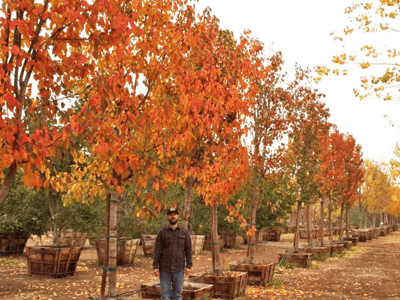 The Flowering Pear tree is noted for its profuse late winter and early spring show of white flowers and lustrous leaves. Adding to the interest are the scallop-edged, oval-shaped leaves that go from glossy dark green to a rich, purple-like red fall color. This change of colors gives you the ability to see and feel the changes in the seasons.
The Flowering Pear tree is noted for its profuse late winter and early spring show of white flowers and lustrous leaves. Adding to the interest are the scallop-edged, oval-shaped leaves that go from glossy dark green to a rich, purple-like red fall color. This change of colors gives you the ability to see and feel the changes in the seasons.
A moderate to fast-growing tree, Flowering Pears need low to moderate watering once established. They love full sun exposure and are versatile trees that are highly resistant to fire-blight. Their fire-wise features make them an excellent choice for firescaping. Homeowners are sure to appreciate their easy-to-care-for features, with pruning only required for shape and structure after their flowering season.
Another attractive feature, especially for homeowners in urban environments, is their tolerance for urban pollution. Feel free to plant these trees in urban gardens and bring natural beauty into the city.
Here at Moon Valley Nurseries, we carry several varieties including the 'Aristocrat', 'Bradford', and 'Chanticleer' cultivars.
Flowering Pear Traits & Care Tips
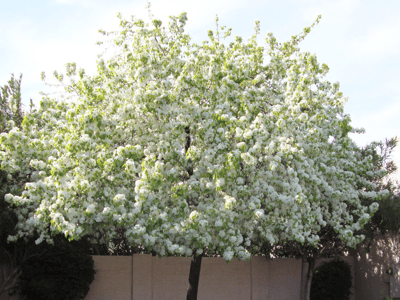 Fall Color: Purple and Red
Fall Color: Purple and Red
Landscape Uses: Shade, Privacy screens, large ornamental, firescaping, Fall color
Sun Exposure: Full sun
Water Needs: Low to Moderate, drought-tolerant once established
Care Tips: Prune to maintain desired canopy shape and size after flowering period, fertilize monthly from early spring to fall for more lush growth and fuller coat of white flowers
-1.png?width=500&name=Untitled%20design%20(23)-1.png)
5. Shumard Oak (Quercus shumardii)
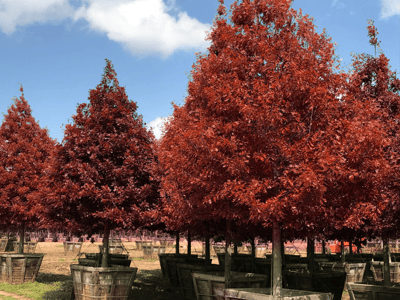 The Shumard Oak, or Red Oak, has quickly become one of the most popular Oak varieties for home and business landscapes across the western United States. These incredible trees boast a large canopy that grows in a pyramidal shape at younger ages and branches out to an expansive vase-like pattern at maturity. Shumard Oaks provide ample shade during the summer months from their lime-green foliage, while transitioning to a jaw-dropping bright red color in the fall.
The Shumard Oak, or Red Oak, has quickly become one of the most popular Oak varieties for home and business landscapes across the western United States. These incredible trees boast a large canopy that grows in a pyramidal shape at younger ages and branches out to an expansive vase-like pattern at maturity. Shumard Oaks provide ample shade during the summer months from their lime-green foliage, while transitioning to a jaw-dropping bright red color in the fall.
This Oak variety works very well in a variety of landscapes due to its ability to quickly establish to a planting location. They are easy to care for and become drought-tolerant once established. This makes them water-wise, having only low to moderate water requirements.
Shumard Oaks are one of the fastest-growing trees in the Oak family, further contributing to their popularity. They grow to a medium to large size and have long lifespans, perfect for planting as a family estate tree!
Shumard Oak Traits & Care Tips
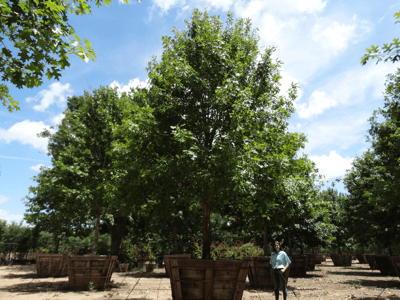 Fall Color: Bright red
Fall Color: Bright red
Landscape Uses: Shade, Privacy, Fall color, Family tree, Property borders
Sun Exposure: Full sun
Water Needs: Moderate to low, drought-tolerant once established
Care Tips: Prune to maintain desired canopy shape and size, fertilize monthly from spring to fall for more lush growth and fuller shade
-1.png?width=500&name=Untitled%20design%20(23)-1.png)
6. Sycamore (Platanus wrightii)
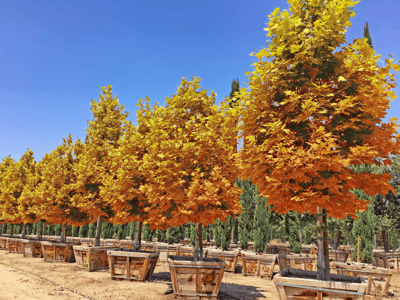 Arizona Sycamores are Southwestern natives that can grow to become large deciduous trees. They have a spreading canopy that casts cooling shade during hot summer days while allowing the warmth of the sun in after they drop their golden fall foliage!
Arizona Sycamores are Southwestern natives that can grow to become large deciduous trees. They have a spreading canopy that casts cooling shade during hot summer days while allowing the warmth of the sun in after they drop their golden fall foliage!
They have beautiful light green leaves fixed atop a gorgeous white bark that peels back to reveal a mottled patchwork that adds textured interest and year-round color! We like to plant them as lawn trees, shade trees, trees for privacy, and any other spot where they can grow and be enjoyed by the entire family!
Sycamore trees are rugged and thrive in areas that get plenty of full sun exposure. Once established, they have low to moderate watering needs, and the roots act as good soil binders to prevent excessive erosion. These features also make Sycamore trees a great tree for firescaping.
We like to plant them as focal points in the yard, along driveways, along property borders, or anywhere you need hardy shade and great fall foliage! When planted in rows, they also are one of the best trees for privacy and windscreens.
Sycamore Traits & Care Tips
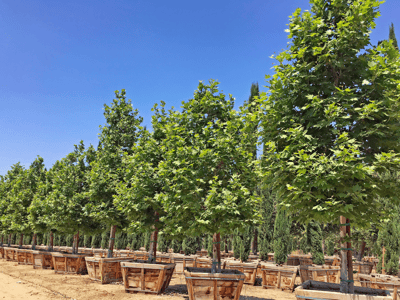 Fall Color: Bright golden-yellow
Fall Color: Bright golden-yellow
Landscape Uses: Shade, Privacy, Seasonal fall color, Property borders, Windscreens, Firescaping, Erosion control
Sun Exposure: Full Sun
Water Needs: Moderate to low, drought-tolerant once established
Care Tips: Fertilize monthly from early spring to late summer to push more soft green foliage. Sycamores also benefit from subtle shaping to help the overall canopy height and width fit your yard and landscape goals.
-1.png?width=500&name=Untitled%20design%20(23)-1.png)
7. Arizona Ash (Fraxinus velutina)
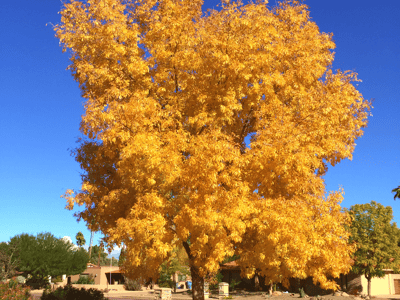 Native to the southwestern United States and Mexico, Arizona Ash trees are a favorite in a wide range of landscapes from residential to commercial, and even in city park applications. They are fast-growing trees with a wide canopy pattern, providing homeowners with lush shade fast!
Native to the southwestern United States and Mexico, Arizona Ash trees are a favorite in a wide range of landscapes from residential to commercial, and even in city park applications. They are fast-growing trees with a wide canopy pattern, providing homeowners with lush shade fast!
We like to plant Arizona Ash trees as focal points in the yard, along driveways, along property borders, or anywhere you need hardy shade and great fall foliage! When planted in rows, they also are one of the best trees for privacy and windscreens.
The Arizona Ash thrives in locations with full sun exposure. These popular fast-growing trees are cold hardy and heat resistant, making them a great shade tree choice for our region! Arizona Ash are deciduous trees with bright yellow-gold fall color, which means they will let the warmth of the sun in during the winter and cast a wide umbrella of shade just in time for the summer!
Arizona Ash Traits & Care Tips
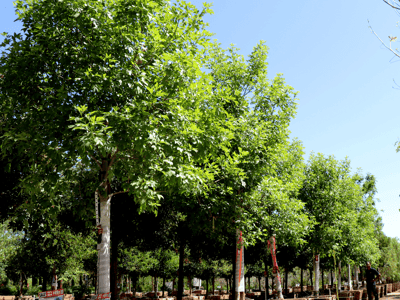 Fall Color: Brilliant Yellow and Gold
Fall Color: Brilliant Yellow and Gold
Landscape Uses: Shade, Privacy screens, windscreens, property borders, seasonal fall color
Sun Exposure: Full sun
Water Needs: Low to moderate, drought-resistant once established
Care Tips: Trim and prune to shape canopy to desired size and form, fertilize monthly from early spring to early fall for more lush growth and fuller shade
-1.png?width=500&name=Untitled%20design%20(23)-1.png)
Choosing any of these trees or better yet, a combination of them will bring abundant autumn color to your yard during the fall season while providing your landscape with shade, privacy, and even flowers!
Our nursery pros have developed care guides for many of the trees and plants we grow to help you nurture your landscape and take the guesswork out of having a green thumb. Additionally, we carry specialized fertilizers developed for plant material that grows in our region’s soil and climate at all of our Moon Valley Nursery locations. These fertilizers are perfect for getting the most out of your trees. Feel free to stop by and ask our Nursery Pros about them!
If you’ve been looking into designing your dream yard and need advice on adding fall color, year-round interest, privacy, or fast-growing shade to your home, reach out to one of our professional landscape designers. They are happy to help design your perfect front yard, driveway, poolside, or backyard design layout. They are available for free design consultations at all our nursery locations, or you can call your local designer here!

Submit a Comment